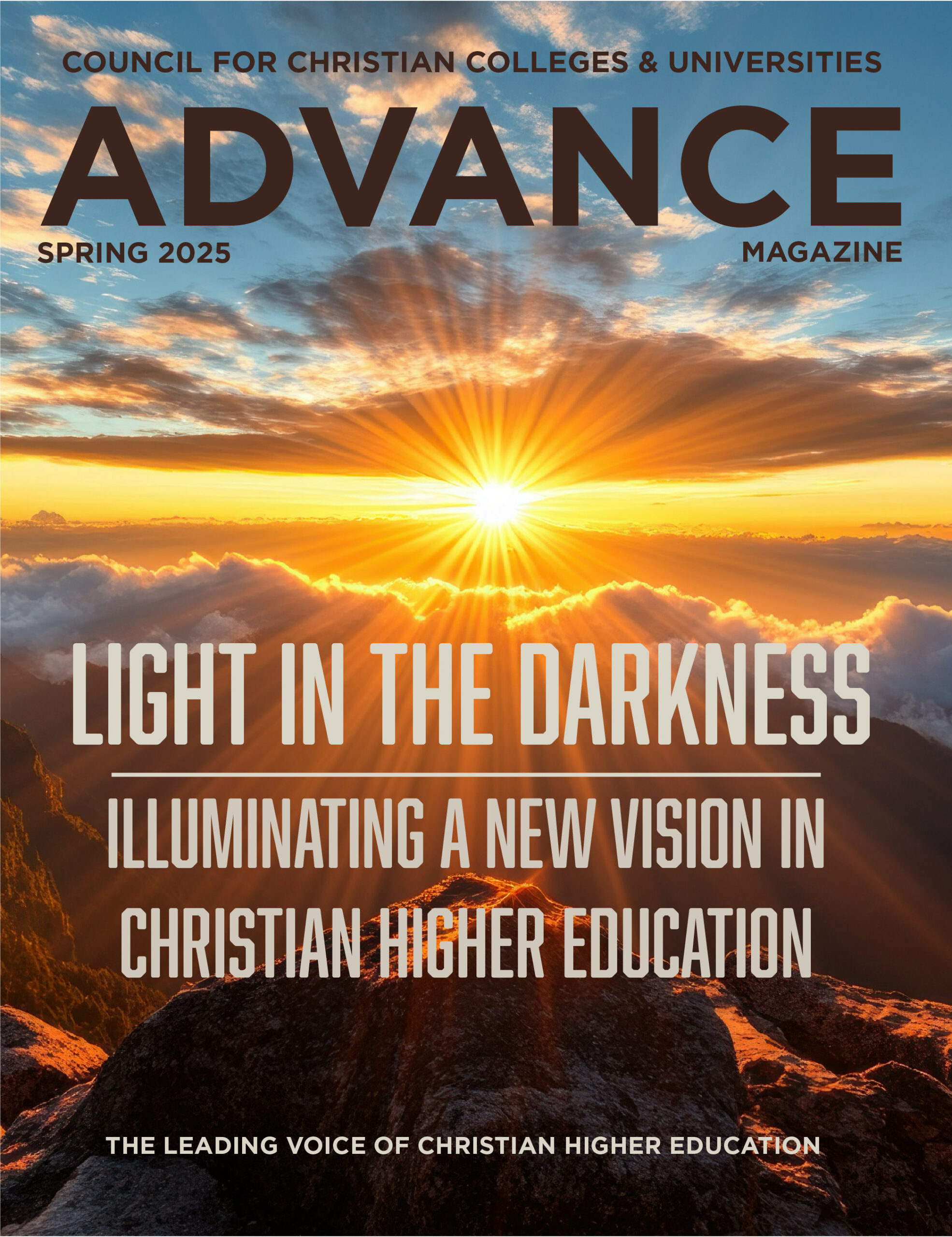Magazine
“Institutions of higher education are conducted for the common good and not to further the interest of either the individual teacher or the institution as a whole. The common good depends upon the free search for truth and its free exposition,” states the opening of the “Statement of Principles on Academic Freedom and Tenures,” published in 1940 by the American Association of University Professors (AAUP). Endorsed by more than 250 national scholarly and educational associations, this is key to understanding how higher education traditionally regarded the importance of academic freedom — the freedom to think and investigate within one’s subject without interference — in fostering the search for truth and advancing the common good of society.
For Christian colleges and universities, this academic search for truth has always been rooted in the Gospel truth, succinctly summarized by Jesus in John 8: “If you abide in my word, you are truly my disciples, and you will know the truth, and the truth will set you free.” Christian higher education remains true to biblical values and standards, even in the midst of changing educational and societal standards.
At CCCU institutions, a biblical understanding of the world does not eradicate academic freedom and the ability to explore subjects and ideas. Rather, it enables it. The challenge is to help everyone — on campus and off — understand and apply this reality.
To explore this relationship between the integration of faith and learning and academic freedom, Lizzy Swoboda, the CCCU’s government relations fellow, interviewed two CCCU presidents. Thanks to their experience both as institutional leaders and theologians, both Philip Graham Ryken and Gordon T. Smith are intimately familiar with the challenges and opportunities of navigating the integration of faith and learning in the context of academic freedom.
Ryken is the president of Wheaton College (Wheaton, IL), where he also serves as a professor of theology. He published more than 50 books and served on the boards of multiple faith-based organizations (including the CCCU). Smith is the president of Ambrose University and Seminary (Calgary, Alberta), where he also serves as professor of systematic and spiritual theology. He has written more than a dozen books and also serves as a teaching fellow at Regent College (Vancouver, British Columbia). Swoboda is a graduate of Grove City College with an interest in exploring education and how it intersects with faith; she is currently a part of the Capital Fellows leadership development program.
The interview was conducted both in-person and over email; it has been edited for clarity and length.
Lizzy Swoboda: Could you share with us traditional notions of academic freedom and why it is important to higher education?
Philip Ryken: Traditionally, academic freedom was designed to protect a faculty member’s ability to teach, do research, and explore the world of ideas without a lot of preconceived notions about what truths they would discover or institutional control over what the outcomes of their research would be. Galileo provides helpful historical background on this idea. In his culture, Galileo did not have the freedom to say that the Earth was not the center of the universe. There was a constraint on truth, because there was a limit on the freedom of exploration of the world and of truth. Academic freedom works to keep that from happening today.
In the popular understanding, people think of academic freedom as a faculty member’s ability to say whatever they want to say. That’s actually not what academic freedom means; it is freedom specifically in the areas of their teaching and research and expertise. It is a confined freedom. It is also important to add that it is not just faculty members that need the freedom to explore ideas, it is also students and institutions within higher education.
CCCU governing members require a statement of faith from their faculty members. Can you describe how the statement of faith interacts with academic freedom?
Gordon Smith: I suggest two perspectives. First, think of the statement of faith as the boundaries of a soccer pitch: you can play within the pitch to your heart’s content — and battle for the ball and engage the back-and-forth of an intense soccer match with alacrity and skill. But out-of-bounds is out-of-bounds. And so we have freedom within those boundaries, but we are not free to play outside of them.
And yet, second, part of the vitality of a CCCU school is precisely that this is a safe place to ask the hard questions [ones] that not so much challenge these boundaries as explore what those boundaries mean. We recognize that the game of soccer does include times when we step off the pitch and ask what it is that we are doing and why the coach actually stands outside of the playing field but is a full actor in the game. I may be pressing my metaphor too far, but what I want to highlight is that in our studies, we are not insular, locked away in a cloistered monastery. We do engage the world and the questions that emerge from outside of our immediate playing field. Doing so is not a violation of our statement of faith but a recognition that our faith is found and expressed within a broader intellectual world.
I have heard many people argue that institutions that have a statement of faith and are committed to Christian values lack objectivity and true academic freedom. How would you respond to that, Dr. Ryken?
Ryken: A misconception in secular higher education is that Christ-centered institutions do not have or do not value academic freedom because we have theological convictions that have a bearing on our thinking, which is seen as a constraint or a limit on academic freedom. However, virtually without exception, CCCU faculty would say they have much greater academic freedom. Most of our faculty have a university education, have done doctoral work in secular contexts, and have had some teaching experience at a research university. But they feel much more freedom to fully be who they are in a classroom context when prayer is a part of classroom life and when they can think about the key issues in their discipline from a Christian perspective. They experience greater freedom because they are liberated from what is often the tyranny of secular presuppositions about academic work and can explore their own foundational assumptions that come from their Christian convictions.
Christ-centered institutions value academic freedom so much that we have worked out our convictions and created our own statement. The CCCU has a two-page document that, in a public way, explains how our concept of academic freedom may differ from the AAUP’s standard. It says, in part:
Ultimately, the commitment of CCCU institutions to academic freedom is rooted in the enterprise of Christian education itself. First, we seek to form students into mature Christians who will contribute positively to the common good. In order to do so, professors need freedom in the classroom to challenge students’ assumptions and expose them to new ideas and subjects. Second, we seek the continual re-forming of the church and society to more closely reflect God’s standards of justice and goodness. As such, professors require freedom in research to discover new insights and to challenge inherited systems and ideas. Academic freedom, therefore, is essential to the Christian university.
Everyone has assumptions that they bring to the thinking that they do. As Christ-centered institutions, we are clear and public about our presuppositions. Our approach to academic freedom is similar to the approach we take to chapel worship at Wheaton. In one sense, it is required, but actually it is entirely voluntary. No one is required to go to Wheaton, and we make it clear from the beginning that we have required chapel. We fully understand our model might not be the best fit for all students. In the same way, faculty members should have the freedom to choose to serve in institutions that share their religious convictions. The honest assessment and articulation of our foundational beliefs ultimately furthers the goal of the free exchange of ideas.
What responsibilities does cultivating academic freedom create for your faculty members, Dr. Smith? What responsibilities does academic freedom create for students, especially in today’s environment where disagreement is often conflated with hatred?
Smith: One of the challenges of our current climate is that students are so easily offended and that they have been taught to assume that they should be offended, and we end up coddling them rather than fostering intellectual and emotional maturity. From the beginning, we can and should be saying that even if you are in a Christian university, you are being equipped to function and flourish in a pluralist and secular context where you will not be coddled and where your faith will be routinely challenged, if not actually ridiculed. So, put your seatbelts on, and perhaps a hockey helmet as well; we are going into some rough terrain here that will leave you intellectually and emotionally stronger.
But we are still gentle as doves. The professor at Hamline University, who was let go because she upset Muslim students in her class by showing a painting in her art history course that depicted the Prophet Muhammad’s face, gave her class plenty of notice of what was coming; she was respectful of the social, religious, and emotional terrain of her students. My concern is that many students, and especially parents and religious leaders, think that students in a Christian university will be indoctrinated and that this will be a safe place where they will not be challenged. What happened at Hamline is that what occurred in class “got out” into the larger constituency. And rather than the constituency affirming that this is what needs to happen in a university, it balked and screamed without any real appreciation of what needs to happen in the classroom.
In other situations, constituents think that faculty cannot raise questions about Black Lives Matter or Palestinian rights or matters of human sexuality. But surely, academic freedom means that we ask the hard questions; we look at the complex issues and encourage students to think for themselves. Having said that, faculty need to respect the terms of the game and resist the temptation to use the classroom as a bully pulpit for political gain. Trust the student to engage the issues and teach them to think critically and compassionately. If we teach them how to think and learn and listen, we have been effective rather than assuming that if they agree with the teacher, the teacher has been effective.
In other words, academic freedom is a responsibility for both the institution and the faculty member; and it is a privilege that can be abused.
In his classic The Idea of a Christian College, Arthur Holmes wrote about the early leaders of the Reformation: “Religious liberty and academic freedom went hand in hand, insisting on the right to examine the cherished and to improve on the past. … It is not by accident that freedom of conscience is part of the Reformation heritage.” Do you see this heritage still alive in Christian higher education?
Ryken: I do see this heritage alive today, although I think we do not talk about freedom of conscience nearly as much as people did in the Reformation and post-Reformation era. One of the reasons the Reformers believed so strongly in freedom of conscience is because they believed in the sovereignty of God and the work of the Holy Spirit. So, they did not feel that they needed to control the freedom, the religious liberty, and the conscience of other persons, but believed that we each answer to God for our own thoughts and actions. More clearly, after the Reformation, they came to recognize that they could not and should not try to coerce people to have certain convictions.
The reason we have religious liberty in the United States is because Christians believed in religious liberty. As Christians, we know we do not need to force anybody else to become a Christian. We can share the gospel and leave things up to God’s sovereignty and the work of his Spirit in people’s lives. We also have a deep respect for individual personhood and believe that each person is made in the image of God and has a will and a heart and a mind. Christians since Antioch and Alexandria have wanted to bring the best of education under the lordship of Jesus Christ and were at the forefront of the thinking that led to a nation that valued religious liberty. We do not believe that only Christians should have religious liberty. Actually, we believe all people should have religious liberty because we believe in the freedom of the conscience.
We also prize religious liberty because we see threats to it. Government regulations, accrediting bodies, and organizations like the National Collegiate Athletic Association are places where the prevailing attitudes of our culture influence and potentially threaten our ability to carry out our mission. We are passionate about religious liberty so that our institutions can have the freedom they need to honor God and offer the education they uniquely can provide. In short, I see freedom of conscience alive and well within our Christ-centered colleges and universities, but much less well understood in the academy generally.
Both Ambrose and Wheaton foster an environment where biblical faithfulness and academic freedom flourish. How do you cultivate that community, and what advice would you give to institutions seeking to continue that approach?
Smith: I would say, simply, two things. One, we are seeking to cultivate critical and compassionate thinking. Two, respect the boundaries and honor what it means to be part of this university — a community of learning. We ask faculty to respect our social and religious location; and we will in turn give them freedom to raise challenging questions and explore topics that may unsettle our constituents. But can we do this from a posture of mutual respect?]
Ryken: From an institutional standpoint, a school’s understanding of academic freedom should be reviewed from time to time and should be a part of faculty orientation. For students, the best way to learn how to love academic freedom is to experience the vigorous exchange of ideas. The more that students experience an atmosphere of, “I’m not sure I know what I think about that, but I want to figure that out and learn,” the more an appetite for pursuing truth grows. I also think that when students see how their Christian faith shapes how they look at the world, it gives greater understanding to what they are exploring and teaches them to value academic freedom. Here is a quote from the 1877-1878 Wheaton College Catalog one I think people today might be surprised to hear today: “Free discussion is encouraged in all these studies. And students are not expected to adopt without question the views of either textbook or teacher, but to think for themselves.” From our historical founding, we were meant to be a “how to think” institution, not merely a “what to think institution, and this is important for faculty and students to understand.




